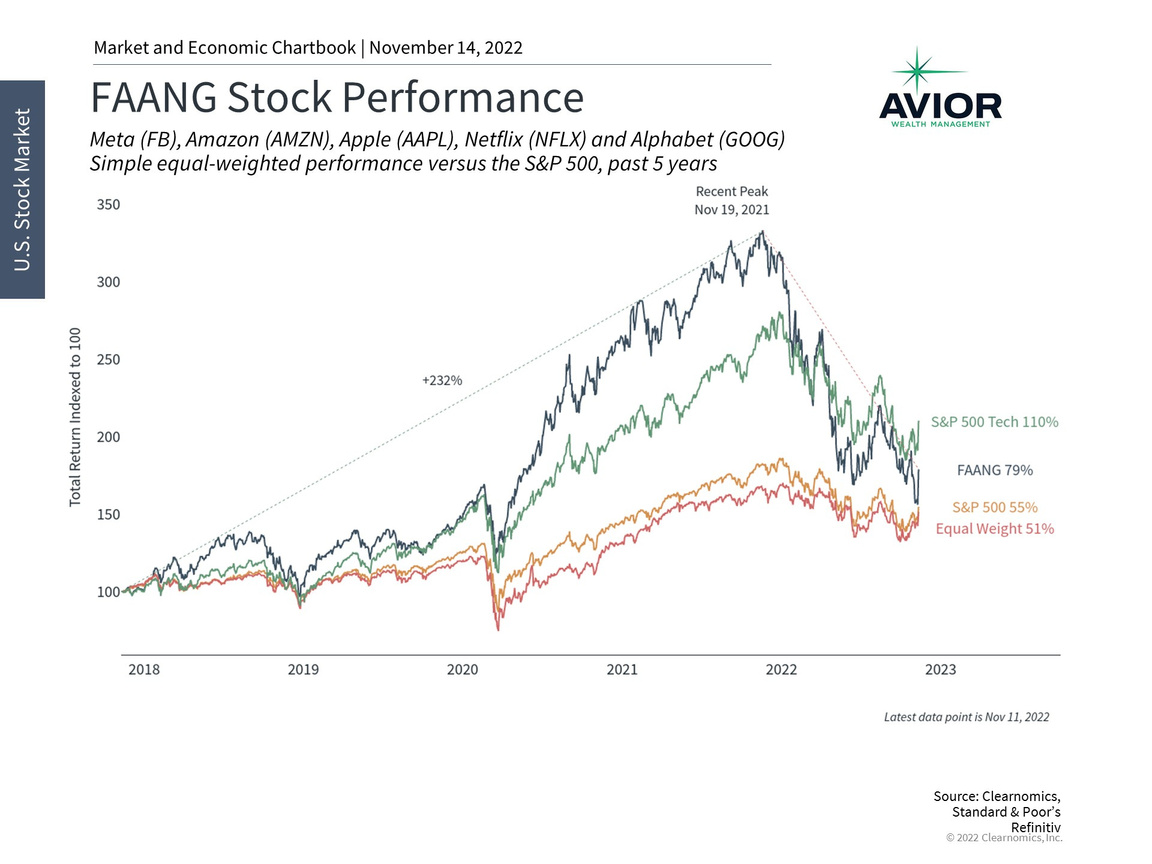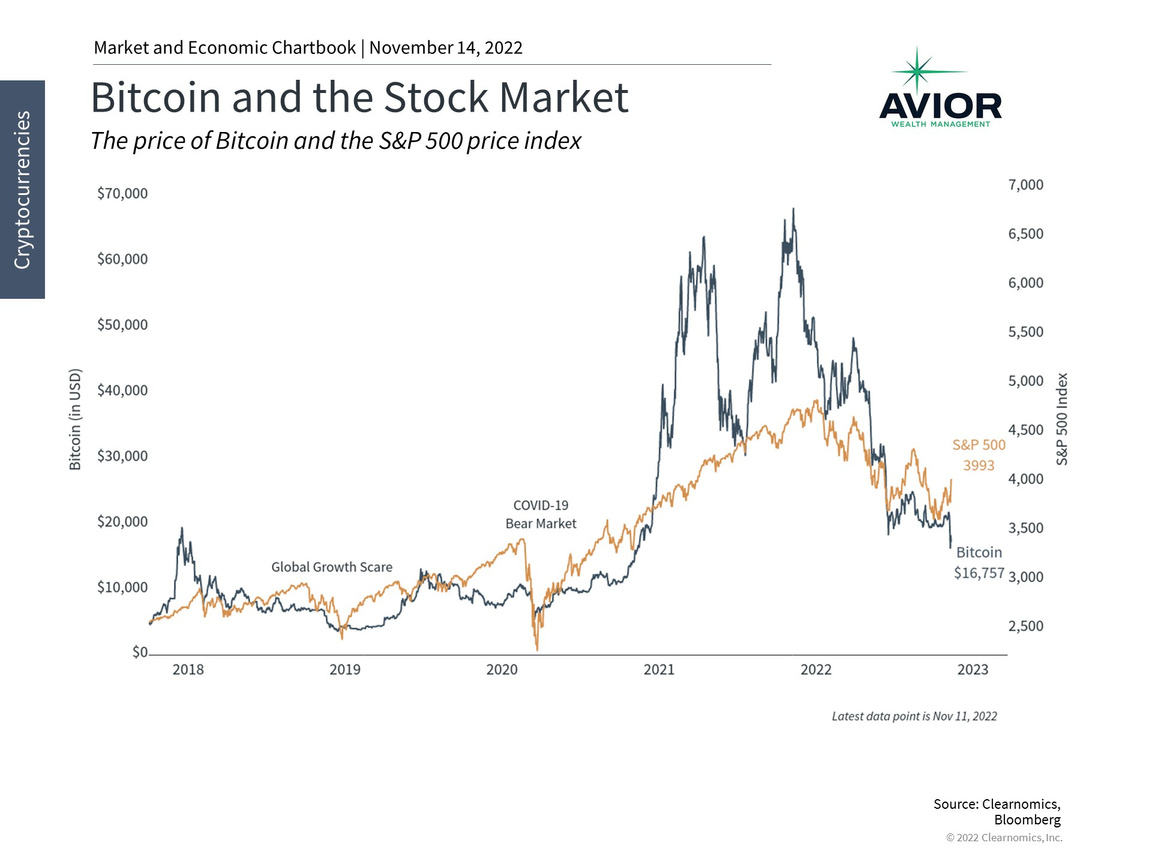AVIOR INSIGHTS – How Investors Can Navigate the Tech and Crypto Cycle
Over the past decade, the tech sector has benefited as the digital revolution has accelerated, including during the pandemic when technology enabled work-from-home, home fitness, entertainment and other capabilities. However, slowing consumer and business demand, return-to-office trends, rising interest rates, company-specific events, and the crash in cryptocurrencies have put a damper on the sector. Despite recent gains, the Nasdaq has declined 28% this year, worse than the 16% and 7% losses for the S&P 500 and the Dow, respectively.
There are a few key points to note to understand this performance. First, these numbers need to be put into perspective. Despite the volatility and poor year-to-date performance, the Nasdaq has held onto gains of 15% since the February 2020 pre-pandemic peak and 65% since the pandemic lows. The S&P 500 tech sector has more than doubled over the past few years. Of course, it’s the wild ride over this period, as shown in the chart above, that makes it feel worse than these numbers might otherwise suggest.
Both economy-wide and company-specific factors have affected tech performance

Second, it’s important to distinguish between economy-wide factors and company-specific ones. Rising rates, for instance, disproportionately impact tech stocks since their valuations are based on cash flows that are potentially far off into the future. When interest rates increase, the present value of these cash flows decline at a faster pace. Not only does this affect price levels but uncertainty around rates can cause large swings in both directions, including a recent one-day jump of 7.4% for the Nasdaq in reaction to positive inflation data. These factors have kept the price-to-earnings ratios for tech-related sectors around 20x, well above the S&P 500’s multiple of 16.5x.
Unfortunately, these headwinds have also resulted in sizable layoffs across tech companies. One estimate, based on data from layoffs.fyi, suggests that there have been 23,000 individuals laid off across 42 tech companies so far in November. While this has not translated into broader layoffs across the economy yet, the sheer magnitude is significant when compared to the net gain of 4,000 information jobs and the 261,000 total payrolls added in October.
In contrast to the economy- and sector-wide trends, the bet on the metaverse made by Meta and others, as an example, remains a source of uncertainty and debate among informed investors, and in any case may take years to come to fruition. While companies such as Meta may be large and important components of tech indices, this is a reminder that investors ought to stay diversified across tech, especially in periods when exuberance was at its peak. After all, the goal of investors is to hold portfolios that benefit from long-term trends. Despite the challenges facing tech today, the digital revolution is still fueling fundamental changes to the economy across online retailers, mobile technology, digital streaming services, and other advancements.
Cryptocurrencies, including Bitcoin, have plummeted

Third, one important difference between now and the early 2000s is that many tech companies are not only profitable but have long-established business models. This is in contrast to the dot-com crash when some highly-valued internet companies were backed by little more than promises. In fact, today’s tech companies span many sectors beyond Information Technology. Amazon, for instance, is categorized under Consumer Discretionary while Alphabet (Google’s parent company) falls under Communication Services. Technology has driven growth across all other sectors from Energy to Health Care.
Unfortunately, profitability and adoption are still open questions for the most hyped parts of tech. Blockchain and cryptocurrencies, for example, have struggled due to falling coin prices and, more recently, the collapse of FTX. While the full saga is beyond the scope of this discussion and the situation is still evolving, it can be summarized by overexuberance among investors on the one hand, opaque financial leverage on the other, combined with alleged illegal practices across FTX, Alameda Research and other related companies. Regardless of one’s views on cryptocurrencies and the future of decentralized finance, it’s important to maintain diligence and construct portfolios properly to minimize risk while benefiting from trends.
Thus, the current market environment highlights the aftermath of valuations becoming detached from reality. In both good and bad markets, the question of whether and how much to invest in any asset, whether it’s a blue chip stock, cryptocurrency, hyped tech stock, or a Treasury bond, depends on the risk and return characteristics relative to a balanced portfolio. While shake-ups are occurring in the tech space, the need for diversification and proper portfolio allocation, ideally with the guidance of a trusted advisor, have not changed.
The bottom line? With challenges among tech companies and in the crypto space in the headlines, investors ought to stay focused on the long run and maintain proper portfolio allocations across sectors.
Disclosure: This report was obtained from Clearnomics, an unaffiliated third-party. The information contained herein has been obtained from sources believed to be reliable, but is not necessarily complete and its accuracy cannot be guaranteed. No representation or warranty, express or implied, is made as to the fairness, accuracy, completeness, or correctness of the information and opinions contained herein. The views and the other information provided are subject to change without notice. All reports posted on or via www.avior.com or any affiliated websites, applications, or services are issued without regard to the specific investment objectives, financial situation, or particular needs of any specific recipient and are not to be construed as a solicitation or an offer to buy or sell any securities or related financial instruments. Past performance is not necessarily a guide to future results. Company fundamentals and earnings may be mentioned occasionally but should not be construed as a recommendation to buy, sell, or hold the company’s stock. Predictions, forecasts, and estimates for any and all markets should not be construed as recommendations to buy, sell, or hold any security–including mutual funds, futures contracts, and exchange traded funds, or any similar instruments.
Avior Wealth Management, LLC, 14301 FNB Pkwy, Suite 110, Omaha, Nebraska 68154, United States, 402-810-7831
No Comments
Sorry, the comment form is closed at this time.


